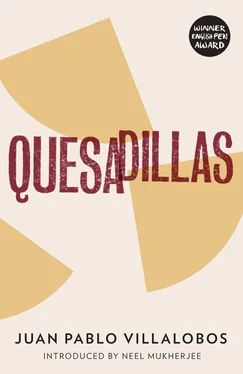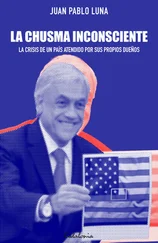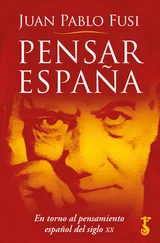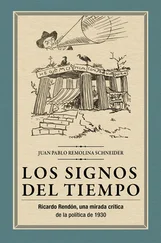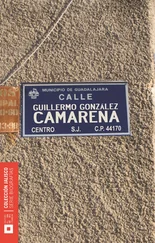My father wasn’t in the mood for worrying about the catastrophic state of the nation just now. His emergencies were local ones: the interim mayor — who had been put in place after the electoral fraud, followed by the capture and evacuation of the town hall — was taking advantage of the impunity typical of his position, exacerbated by the fleeting nature of his mandate, to authorise dividing the Cerro de la Chingada up into lots.
It was a project to create an upmarket housing development on the western side of the hill — where we lived — since apparently the rich were growing tired of their hectic lives in the centre and wanted to spend the night among acacia trees, contemplating the town from on high. Given that the hill’s name was not exactly a great promotional device, the project had the pretentious — and sarcastic, if we took it personally — name of Olympus Heights. To tell the truth, not only had Jaroslaw been right in his real-estate predictions, but he was actually involved in the deal too. It begged the question of what came first: whether Jaroslaw was the chicken in the process of laying that particular egg, or whether the project was going to hatch from the egg Jaroslaw had foreseen. Whatever it was, various partners took it in turn to incubate the egg, among them the two most prominent families of Lagos, the ones that had controlled political and economic life since colonial times, and whose ranches by a causal coincidence happened to be clients of Jaroslaw.
Jaroslaw and my father had regular discussions, although really Jaroslaw was the insistent one: he would come by our house in the evenings and ask my father to come out and talk in the street. By street, I mean the dirt track that led to our house and the Poles’ mansion, deep in the hills. My father didn’t tell us anything about these conversations but Jaroslaw made sure I knew, because he had a little part set aside for me in his plan: I was going to have to incubate that egg for a little while too.
‘I’m offering your father a really good deal. But your father is very stubborn and refuses to have anything to do with it. He doesn’t realise that with this deal you’d all be much better off. He’s got some very strange ideas. Do you know what I’m talking about?’
‘No.’
‘Your dad hasn’t told you anything?’
‘No.’
‘Haven’t you heard him talk to your mother about this?’
‘No.’
‘I’m not surprised she doesn’t know anything. I need to speak with her. What time does your father leave for school?’
‘I don’t know.’
‘You don’t know? Do you like living in that dump? Wouldn’t you like to live in a nicer house?’
The deal was that our dump was in the way. Jaroslaw was offering to buy our house, that is, the land, at the current market price. My father refused to sell it, because of an incomprehensible attachment, although Jaroslaw thought it was because he had ambitions to sell it when the price rocketed once the hill had been developed. Nonetheless, Jaroslaw said it was now or never, that he knew how my father had ‘bought’ the land and that if he didn’t accept his, Jaroslaw’s, offer, as the rest of the hill’s wretched occupants had already done, then we would end up with nothing.
‘I haven’t told your father this yet, because I know him and I know how he’s going to react.’ (I knew how too: by summoning the Achaean army.) ‘I want to do things the right way, but if this matter isn’t sorted out fast the bulldozers will appear any day now and they’ll tear down your house. Go and tell your mother I need to speak to her.’
Now I could see why Jaroslaw hadn’t reported Aristotle. First, because while negotiations were ongoing he couldn’t afford to fall out with my father. And second because, if he did end up tearing down our house, he probably thought that was enough of a lesson. The rich were like God, who tightens the noose but doesn’t strangle you. However, I needed Jaroslaw to forget about the Christian God and move on to the fantasy of one of those Greek gods who know no mercy and enjoy crushing mortals.
‘I’ll help you if you do me a favour.’
‘ I’m doing you the favour, can’t you see?’
‘But we can help each other.’
‘What do you want?’
‘I want you to report Aristotle and not withdraw your accusation.’
‘I’m not going to do that. Are you mad? I’m not going to fall out with your parents right now.’
‘So don’t do it now, do it later. There’s no hurry.’
It was true, there wasn’t any hurry: I’d been waiting my whole life for this moment, so why not wait a little longer?
‘Hey, don’t be a bad person.’
A bad person? The chicken talking about eggs?
At last I was really living up to my name: receiving secret assignments, plotting conspiracies, carrying out despicable tasks. I tackled my mother during one of the brief periods when she wasn’t crying.
‘Jaroslaw wants to talk to you.’
‘What have you done?’ Mothers are genetically programmed to give answers like this.
‘Nothing. It’s not about me.’
‘Well, I’ve got nothing to say to that man.’
‘It’s about money. He wants to buy our house and he says Dad doesn’t want to sell it. He says if we don’t sell it they’ll send some bulldozers to tear it down.’
‘And you think I don’t know that?’
‘I dunno. I just wanted to give you the message, that’s all.’
She didn’t know, or at least not the whole story. It was easy to tell, because if she had she would have trotted out the family’s official line, repeated my father’s opinion on the matter.
‘Go and tell him to come over tomorrow at four, but not to be late, because your father gets home at five.’
My first attempt at manipulating family betrayals was turning into a fiasco; I had been demoted to the tame role of messenger. Perhaps they should have called me Hermes instead.
The result of the secret meeting between Jaroslaw and my mother was that that very night my mother declared a quesadilla strike and confronted my father with the TV switched off.
‘You’re going to go and find Jaroslaw right now and tell him we’re selling him the house.’
‘How did you find out? Did he come and see you behind my back? I’m going over there right this minute, but to kick his arse.’
‘Don’t be so dramatic. Heniuta told me. We had a little chat when I was hanging out the washing.’
Don’t be dramatic : the chicken criticising someone else’s clucking. And, of course, my mother was an abysmal liar, because due to the height of our neighbours’ wall only two possibilities presented themselves: either Heniuta was a giraffe or she had climbed up an enormous stepladder to spy on us, which wasn’t exactly the best way to start a conversation with one’s neighbour.
‘They want to buy us, don’t you get it?’
‘No, they don’t want to buy us . They want to buy our house.’
‘No, they don’t. They want to force us to sell them our house.’
‘Force us? Have you asked me what I think?’
‘It’s my house and I decide. We’re not going to sell it. We’re not moving from here.’
My father was right: it was 1987. In Los Altos de Jalisco. Just who did my mother think she was?
My father’s final refusal received an eviction order in reply, based not only on the wrongful appropriation of council-owned land — which was the argument (or threat) with which the rest of the hill’s inhabitants had been blackmailed — but also on a ruling that declared the house an uninhabitable dwelling, being built on a terrace where the hillside had not been sufficiently stabilised. Given our poverty, this was most likely true — even though no architect or engineer had come to the house to carry out an assessment. In short, we were being thrown out for two reasons: for being thieves and for our own good. They couldn’t let the house fall down on top of us and have us deny them the pleasure of pulling it down. There was an ultimatum: we had ten days to clear off.
Читать дальше
